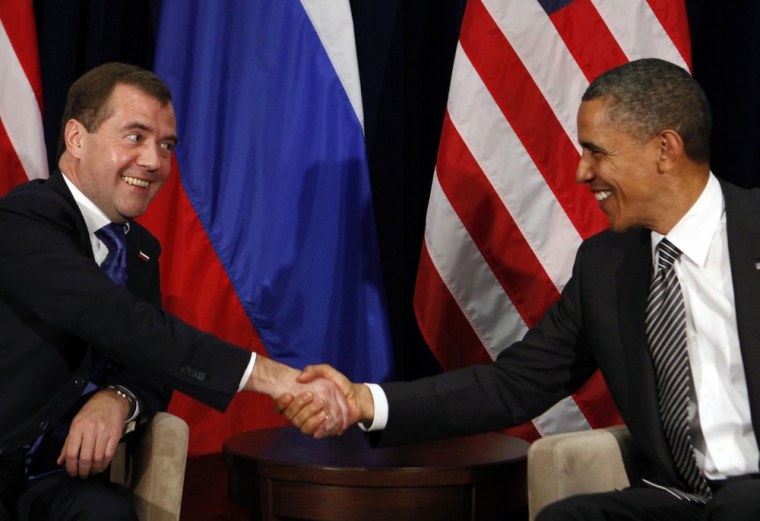President Barack Obama said Saturday that he and Russian President Dmitry Medvedev intend to "shape a common response" to new allegations Iran has been covertly trying to build a nuclear bomb.
The president spoke to reporters as he and Medvedev met on the sidelines of the Asia-Pacific Economic Cooperation summit. He also met separately with the leaders of China and Japan.
Hosting the APEC summit in his native Hawaii, Obama said earlier the "broad outlines" of a deal had been reached on the Transpacific Partnership, a regional free trade pact being negotiated by the United States and eight other countries.
It was hailed by U.S. officials as Obama's signature achievement of the summit and a possible template for an eventual APEC-wide free trade zone. APEC's 21 members make up the world's most dynamic region and account for more than half of global economic output.
Obama sought Saturday to position the United States as a Pacific power determined to get more American jobs by tapping the explosive potential of the Asia-Pacific.
For businesses, he said, "this is where the action's going to be."
"There is no region in the world that we consider more vital than the Asia-Pacific region," he told chief executives gathered for a regional economic summit.
The president went so far as to say the United States had grown "a little bit lazy" in trying to attract business to the United States.
Russia trade
Speaking to reporters at the end of his meeting with Medvedev, Obama said the two "reaffirmed our intention to work and shape a common response so we can move Iran to follow its international obligations when it comes to its nuclear program.''
The two also discussed Afghanistan and Syria, Obama said.
Their meeting was their first chance to discuss Friday's report from the International Atomic Energy Agency, which raised new questions about Iran's nuclear program.
The watchdog agency provided evidence Tehran has conducted research, testing and procurement which could help it develop nuclear weapons. Tehran has rejected the material as a fabrication by the United States and its allies, maintaining its nuclear program is purely for energy and research.
Obama also said Russia's expected entrance into the World Trade Organization is a testament to Medvedev's hard work and will be good for the United States, Russia and the world.
Russia is expected to join the WTO next year. If Russia joins the trade organization, Congress will have to vote on approving permanent normal trade relations.
The U.S. currently denies this status to Russia under Jackson-Vanik, a 1974 law intended to pressure the Soviet Union to allow emigration, primarily of Jews.
Obama says it's a good time to consult with Congress about ending the application of the law to Russia.
Medvedev thanked Obama for his support on the WTO and said Russia had never received similar support from any previous U.S. administration.
China cooperation
Obama also met Saturday with Chinese President Hu Jintao.
Speaking to reporters during a picture-taking session at the beginning of the meeting, said cooperation between the two countries was vital.
Hu also talked of the need for China and the United States to work together, saying it was important in a time of complex changes.
The White House later said Obama pressed Hu to allow China's currency to rise and on the need for a rebalancing in the global economy.
Obama also cautioned Hu that Americans were becoming impatient over U.S.-China economic policies, officials said.
Earlier, Hu sought to reassure executives at APEC that China is open for business and will advance reforms but expects more say in setting the agenda for the global economy.
Economic governance should reflect changes in the global landscape to boost the "voice of emerging markets and developing countries," Hu said in a speech.
"China will work to reform the international economic system and make a more just and equitable international economic order," he said, adding that China would "play a bigger role in international economic and financial organizations."
Japan in talks
Japanese Prime Minister Yoshihiko Noda told Obama Saturday that Tokyo would put all goods and services on the negotiating table in talks to join a U.S.-led effort to create a Pacific free trade area, the White House said.
Noda also told Obama, in a meeting on the sidelines of an Asia-Pacific summit in Hawaii, that he was beginning steps to "review Japan's beef import restrictions and expand market access for U.S. beef,'' the White House said in a statement.
It cited Obama as saying members of the Trans-Pacific Partnership must meet "high standards,'' and said the president had asked his trade representative to begin consultations with Congress and others about any concerns in the agricultural, services and manufacturing sectors over Japan's admission to the talks.
